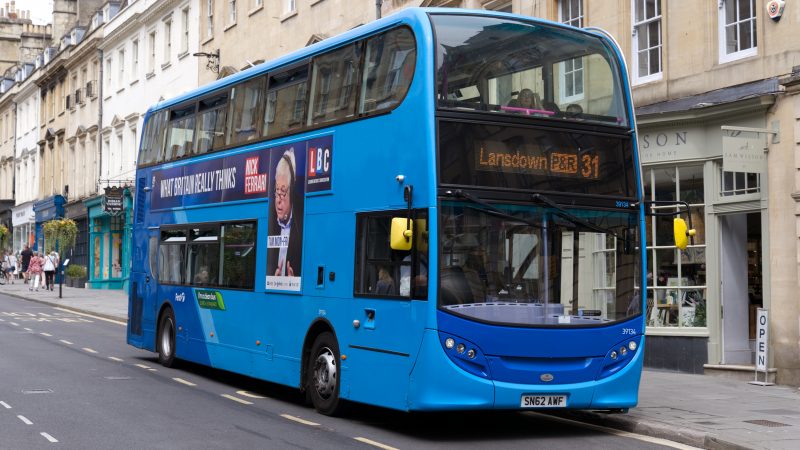
Earlier this month, Shadow Transport Secretary Louise Haigh released a video celebrating one of the defining examples of what Labour is delivering where it is in power: publicly-controlled buses. Alongside Liverpool city region mayor Steve Rotherham, she condemned Margaret Thatcher’s experiment with bus deregulation, a system she described as like “almost nowhere else in the developed world” in the powers it “hands” to private operators.
Labour’s metro mayors in Manchester, Liverpool, Cambridge, Leeds and Sheffield are all using their devolved powers to investigate public control. The Welsh government is going one step further and planning to re-regulate the entire nation’s bus network in one fell swoop.
And then there’s the West of England. Despite facing one of the most severe bus crises in the country, the region’s Labour mayor, Dan Norris, is holding out against following his colleagues towards public control. He’s even facing growing pressure from local leaders and councils, including Labour mayor of Bristol Marvin Rees and Lib Dem-led Bath, to launch the statutory franchising investigation that the government requires before mayors use their devolved powers.
The West of England’s delay on bus reform should concern the Labour Party. Not only does it confuse the picture, with some Labour leaders undermining other regions’ policies, it also threatens a key part of the party’s strategy to rebuild its electoral coalition through policies like the take back control bill. This planned legislation has little flesh on the bones, but what we do know, thanks to LabourList, is that it will give all local authorities the power to bring buses into public control and shift the balance of power away from private operators.
It’s not impossible to see the Conservatives outflanking Labour on this. Their position on Brexit at the 2019 general election already gives their party a greater resonance in many of the leave-voting areas to which the take back control bill is supposed to appeal. And Conservative mayors have not shied away from their public control powers. It was Conservative James Palmer who started the investigation into reforming Cambridgeshire’s buses that identified bus franchising as the best way forward. Just last month, mayor Andy Street oversaw the launch of a bus franchising assessment in the West Midlands. Meanwhile, the Conservative leader of Essex County Council has been calling on the government to give all local authorities public control – something echoed by Alexander Stafford MP in South Yorkshire.
Even if the Labour Party’s national coalition does not interest Norris, he should look at the future of Labour in the region. The Green Party has just displaced Labour as the largest party on Bristol council after a crucial by-election. In English city regions, public support for franchising sits at around three-quarters. In 2021, Greater Manchester mayor Andy Burnham increased his share of the vote to win every single ward, against a backdrop of Labour decline, after making his re-election race a de facto referendum on bus franchising. Tracy Brabin’s victory in West Yorkshire was also put down to pledging to take buses into public control. Delivering a big-ticket change that bridges the supposed gap between voters that might be tempted by the Greens or Reform UK would help secure the region for Labour.
Norris’ future is also far from certain. The reaction by the Conservatives to losing the mayoral positions in Cambridgeshire and the West of England was to ditch the supplementary vote, meaning his chance of reelection has decreased.
The party nationally feels public control is flagship policy. Regional leaders have shown it is an electoral success. The missing factor in the west has been organised, local pressure. Launched last month, the grassroots ‘Reclaim Our Buses’ coalition has supported 30 residents to share their reasons to reclaim control of the network online. Each one has started and finished with a call on local leaders to at least launch a formal investigation of public control at their earliest opportunity – their combined authority meeting on March 17th.
The reasons, mostly explained in selfie-style videos, have focused on personal stories of the misery privately-controlled buses cause: from school children losing their places at leading local schools to workers left feeling unsafe travelling home at night.
This is perhaps the most worrying thing of all for local leaders. Everyone has their story about how bus services have let them down. Most are too shy to share it on camera. Even in the ‘People’s Republic of South Yorkshire’, stalwart campaigners managed to win moves towards public control without having to record a single video – much to their relief.
This tells us something about the levels of desperation in the West of England. It shows that residents are not just angry about their buses: they’re willing to go further than other regions to win public control. If passengers are willing to stand up in public to win buses that work for people not profit, politicians should at least be willing to investigate public control.




More from LabourList
‘The cost of living crisis is still Britain’s defining political challenge’
‘Nurses are finally getting the recognition they deserve’
Letters to the Editor – week ending 15th February 2026